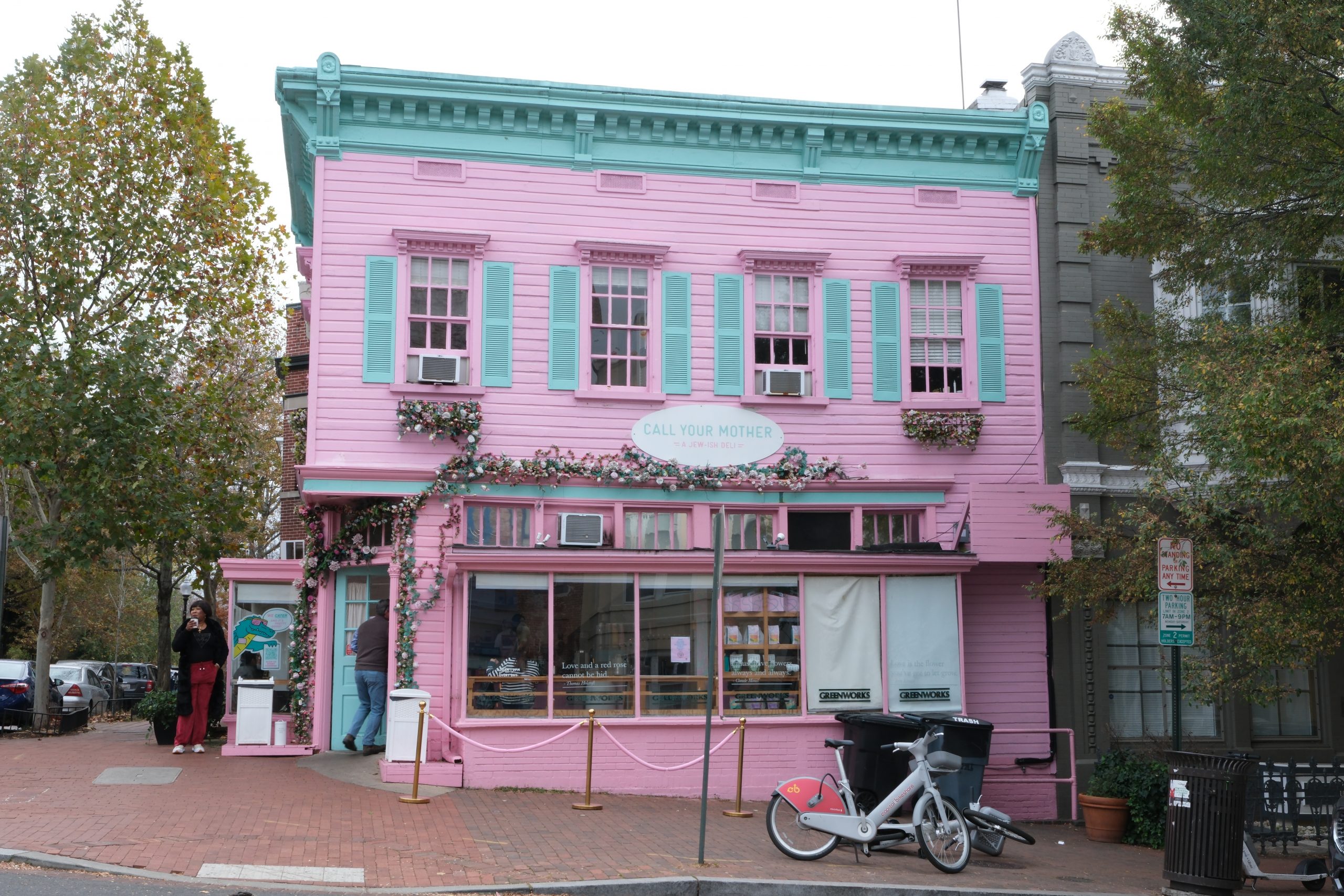After nearly five years of legal and zoning battles, Call Your Mother, the popular “Jew-ish” deli on the corner of 35th and O, will keep baking. In a Nov. 13 meeting, the D.C. Board of Zoning Adjustment (BZA) voted in a 4-1 decision to grant Call Your Mother the zoning conditions needed to continue operating in its Georgetown location.
For Andrew Dana, Call Your Mother’s owner and CEO, this win represented a massive victory for the company and the future of the Georgetown shop, which he’s previously called his “most special” location.
“We think they made the right decision,” he said. “We’re stoked, and we’re stoked to be there for the next 10 years and continue to be great neighbors.”
Call Your Mother’s troubles have to do with century-old zoning laws which designate its location as residential, despite businesses operating in the space since before the law’s creation. Other businesses operating there since the law was created in 1920 have applied for a “nonconforming use” zoning designation. However, because Call Your Mother sells and prepares food, it requires two other forms of zoning relief: an area variance to operate as a “Corner Store” within 750 feet of a commercially zoned lot (Wisemiller’s), and a special exception to sell prepared food as a Corner Store in a residential space.
In order to receive the special exception, Call Your Mother cannot be deemed “objectionable,” or harmful, to the community around it. Some neighbors argue that Call Your Mother has proven objectionable by leaving its trash outside, attracting rodents. Neighbors also say that because Call Your Mother doesn’t have outdoor seating, patrons are often found eating on strangers’ doorsteps or using other businesses’ facilities.
In response to similar complaints at a June Advisory Neighborhood Commission (ANC) meeting, Call Your Mother has made efforts to alleviate some of the stress on the community. According to Dana these changes include daily trash pickup, hiring an employee to stand outside and push patrons off neighboring stoops on holidays and weekends, and posting clear signage about nearby public seating.
After three consecutive BZA meetings with no ruling, a decision was finally handed down in their Nov. 13 meeting . BZA Chairman Frederick L. Hill, Vice Chairwoman Lorna John, District Resident Appointee Carl Blake, and Zoning Commission Chairman Anthony Hood all voted in favor of Call Your Mother receiving both an area variance and the special exception. Crishaun Smith, the board’s representative from the National Capital Planning Commission, was the lone dissenter.
Those who voted in favor of Call Your Mother argued that Dana and his Georgetown team have taken necessary steps to mitigate the potentially objectionable aspects of their presence.
“The proposed conditions would mitigate potentially objectionable conditions,” John said. “I also believe the proposed corner store use would not detract from the overall residential character of the area, and will enhance the pedestrian experience based on the applicant’s description of his operations.”
Still, neighbors say that it simply isn’t enough, and may never be.
“They have put a square peg in a round hole. This restaurant does not belong in a residential neighborhood,” Melinda Roth, a longtime resident of the neighborhood, said. “They don’t have an [Americans With Disabilities Act] accessible bathroom. They don’t have seating.”
Roth believes that the BZA members who voted in support of Call Your Mother ignored complaints by the neighbors in order to please Dana.
“The neighbors have cited numerous objectionable conditions, and one brave BZA commissioner was willing to stand up to them, and the other four rolled over and said, ‘what else can we give you?’” Roth said.
Some stakeholders in the community, including Georgetown Advisory Neighborhood Commission (ANC) commissioner Joe Massaua (SFS ’25), are relieved that the saga has finally reached an apparent conclusion.
“It’s undeniable that Call Your Mother has contributed positively to the neighborhood, and students are passionate about this, and I’ve been happy to support the business throughout the months-long process,” Massaua said. “At the same time, the concerns that neighbors had were real and Call Your Mother must manage crowd control and trash storage appropriately.”
This is just the latest development in what has become a years-long saga. To catch you up to speed: in July 2020, Call Your Mother Georgetown opened its doors. Before the business even opened, neighbors raised concerns about potential long lines and foot traffic in the surrounding area, given the long lines at its Georgia Avenue shop. However, after going to the BZA and receiving the area variance, Call Your Mother was officially able to operate. Not long after, the neighbors filed a lawsuit in which Roth was the plaintiff, alleging that the BZA was incorrect in allowing Call Your Mother to operate at that location. In 2022, the courts partially agreed, and said that in order to remain in business, Call Your Mother would need to be granted a special exception.
Since that court decision, the case essentially ping-ponged between the BZA and the ANC until September, when the ANC ruled that they were in favor of Call Your Mother receiving the area variance, but could not decide on the special exception, deferring that decision to the BZA. While the ANC cannot make official zoning decisions, their rulings serve as a recommendation to the BZA. Call Your Mother was discussed in both the September and October BZA meetings, with the decision delayed each time after hours of testimony.
In their final analysis, the BZA ultimately gave consideration to the D.C. Office of Planning’s assessment of the situation, which was largely favorable to Call Your Mother staying in the spot. The assessment included an instance where an official observed Call Your Mother on a random day when students were in town, and found no objectionable conditions in Call Your Mother’s operations.
Smith, who voted in opposition, grounded his decision in the fact that he doesn’t believe that Call Your Mother matches the “residential character” of the block, and argued that the business was simply too busy and successful to reside in a residential space. Neighboring M Street or Wisconsin Avenue, he said, would be a better fit for Call Your Mother.
”I disagree with the Office of Planning that granting the variance would not be detrimental to the public good and it would not have a substantial harm on the zoning regulations,” Smith said in the meeting. “The intent of a corner store is for a limited commercial and service use in residential zones oriented to serve the immediate neighborhood. Call Your Mother is a very popular shop.”
Other members disagreed, saying that refusing to grant the special exception because of Call Your Mother’s success set a difficult precedent to follow.
“Many of the requirements this successful business has is because of its success,” Blake said. “And I do not believe the regulations require us to penalize a business because of its success.”
With its ruling, the BZA also imposed several conditions on Call Your Mother in order to alleviate neighbor complaints. These conditions, most of which were already in place, include limiting their hours of operation from 7:30 a.m. to 2 p.m., not allowing outdoor seating or food delivery (including via UberEats or DoorDash), and requiring an employee to stand outside on weekends and holidays to direct patrons.
While the saga appeared to end when the BZA members moved on to the next item on the agenda, Roth said the issue isn’t over.
“There will be an appeal process, whether we appeal the administrative decisions or whether we go straight to the court,” Roth told the Voice.
One section of the law that she believes the BZA ruled on incorrectly was deciding whether the owner of the building would incur “practical difficulties” if the special exception was not granted and Call Your Mother’s lease was abandoned.
The previous owner of the property leased to Call Your Mother without knowledge of the saga that would ensue, and thus would incur economic difficulties in losing the lease. However, the building was just sold, and the new owner, she said “took a risk” that the ruling would go Call Your Mother’s way. Roth argues that because they presumptively knew that risk going in, the new owner cannot be assumed to have incurred economic losses.
“Without zoning relief, they did not have the right to operate at that point in time. And the guy bought the property for $1.7 million anyway, and so I don’t see how you can argue that he has some kind of economic hardship or difficulties,” Roth said. “He took a humongous risk that they did not have a special exception or the right to operate at that point in time that he actually closed on the property.”
While Roth and the neighbors still need to discuss next steps, they believe that the law is on their side. Dana, however, feels that the law is on Call Your Mother’s side, and is unafraid of a possible appeal.
“I think we feel confident in an appeal. We think the law is very clear. We think we’ve done everything we possibly can. We think the BZA reasoning was super sound,” Dana said. “We are very confident that we’ll win the appeal and then we can just focus on making bagels and making people’s days a little brighter.”
Other community members are also celebrating the BZA’s decision.
“Call Your Mother clearly sees itself as part of the Georgetown community,” Colva Weissenstein (GRAD ’08), the program manager for Georgetown’s American Studies program, wrote in an email to the Voice. “I love having a great bagel place walking distance from home and work. I love bringing out of towners to have a bagel there”
Weissenstein, who also lives in the nearby Glover Park neighborhood, was one of over 100 individuals who wrote letters of support for Call Your Mother, all of which were submitted to the BZA. The BZA also received 23 letters in opposition to Call Your Mother receiving the special exception.
Weissenstein believes that the business represents an opportunity for dialogue between the residents of the neighborhood and students, many of whom support Call Your Mother for its bagels. The university and students, she argued, are stakeholders too, and shouldn’t have their opinions completely devalued.
“It is vitally important that residents be able to enter dialogue with the University and the students, but I think it’s always important to remember that the university, the residents, and the businesses…in Georgetown are in a symbiotic relationship, we need each other,” she wrote.






